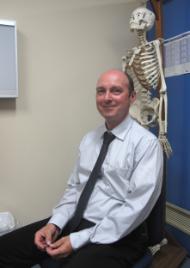Surgeon squeezes PhD between rugby shoulders and netball knees
Published on 27 August, 2010
Orthopaedic surgeon and sports medicine specialist Dr Erik Hohmann has managed to add a PhD to his qualifications, despite being in demand for his operative skills.
Dr Hohmann's unit at Rockhampton Base Hospital is recognised as a leader in high-tech surgery for the classic 'popped clavicle' rugby injury and the 'netball knee' anterior cruciate ligament injury.
The former German medical student sub-specialised in Orthopaedic Sports Medicine in Munich under Andreas Imhoff and gained his specialised skills in South Africa before taking up his post in Rockhampton and forming an association with CQUniversity about eight years ago. He has appointments as an Associate Professor with both CQUniversity and the University of Queensland.
Over several years, he worked alongside former CQUniversity academic Adam Bryant and German medical student Elisabeth Eiling, of Kiel University, to establish a 'netball knee' research unit called the Musculoskeletal Research Unit. Their study proved that young female athletes are at greater risk of knee injury during ovulation, due to higher levels of estrogen making their supportive muscles more tender and pliable.
More recently Dr Hohmann's PhD research has examined the association between clinical outcome tools such as questionnaires and scores and objective findings through laboratory testing.
"Using the functions-testing laboratory at CQUniversity and comparing with traditional outcome tools we have shown there can be a vast difference and the assessments don't necessarily correlate. With the subjective assessment proving inadequate, we've recommended adding hopping tests, strength measurements and radiographic analysis."
Dr Hohmann is now planning for the hospital's own functions-testing laboratory, which will enable him to continue his research of the outcomes of surgery on the 'classic' rugby and netball type injuries.
"I hope to continue to work with CQUniversity and keep links going between the hospital and the University so we can have graduates to work in our laboratory and maybe do some research.
"As a full-time surgeon, it's never easy to find time and I'm happy that the PhD is finalised. It gets me a bit more credibility as an academic person so it's a positive milestone,"
Dr Hohmann will miss his graduation ceremony as he is heading overseas soon to present 'live operations' to educate his medical colleagues in Botswana. He will also visit Taiwan, Hong Kong and Singapore for lecturing/conference presentations.


